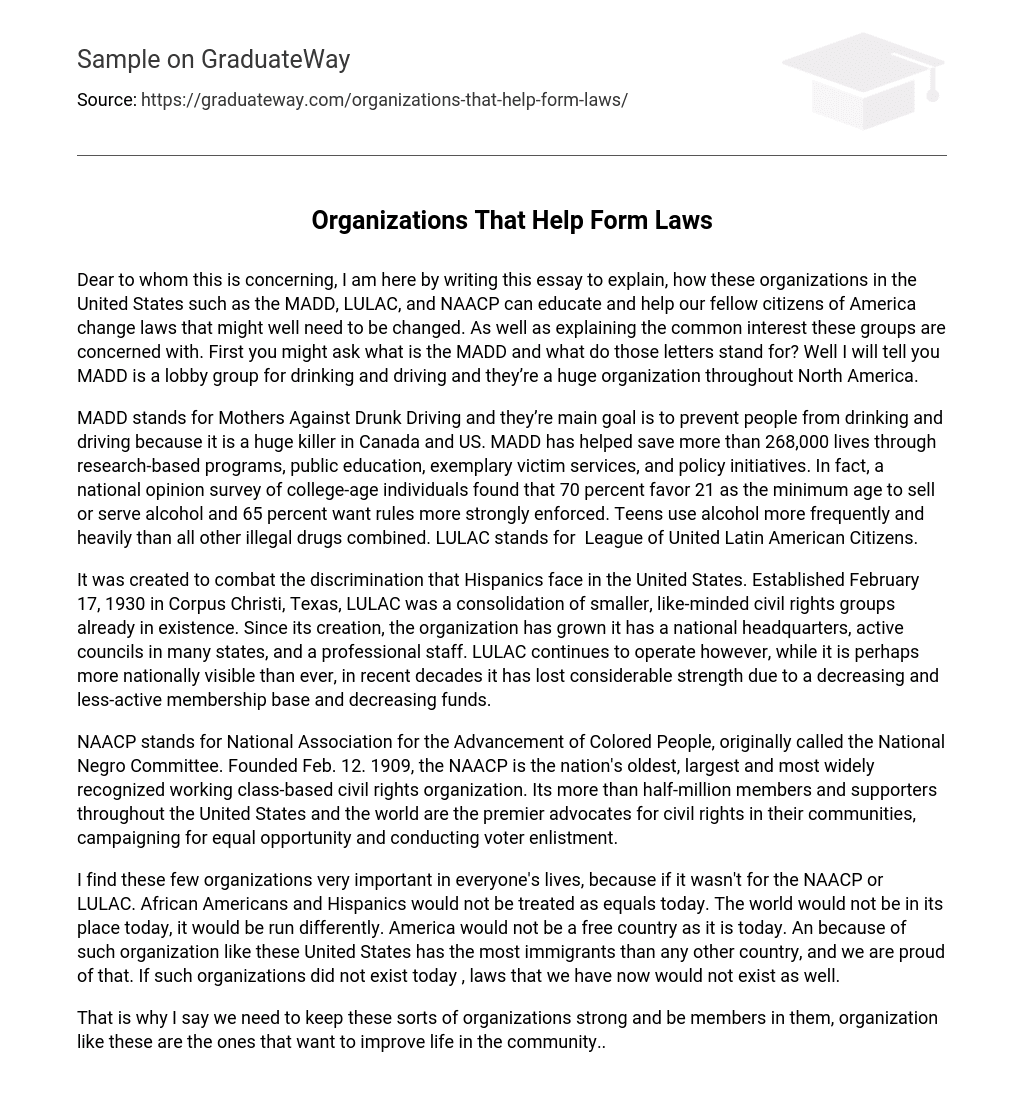Dear recipient,
The objective of this essay is to explore how organizations in the United States, including MADD, LULAC, and NAACP, can educate and support American citizens in their endeavors to promote legal changes. Furthermore, it will examine the common interests among these groups. To start off, let us understand the importance of the MADD acronym: Mothers Against Drunk Driving – a well-known lobbying group in North America.
The organization MADD (Mothers Against Drunk Driving) is dedicated to preventing drinking and driving, which is a leading cause of fatalities in Canada and the US. Their efforts consist of research-based programs, public education, victim services, and policy initiatives that have successfully saved more than 268,000 lives. According to a survey conducted among college-age individuals, 70 percent are in favor of raising the minimum age for selling or serving alcohol to 21, while 65 percent support stricter enforcement of regulations. Among teenagers, alcohol is the most frequently consumed illicit substance and it is heavily consumed. LULAC (League of United Latin American Citizens) is an organization specifically focused on advocating for the interests of Latin American citizens.
The League of United Latin American Citizens (LULAC) is an organization that was founded on February 17, 1930, in Corpus Christi, Texas with the primary goal of combatting discrimination faced by Hispanics in the United States. LULAC originated from the consolidation of smaller civil rights groups already working towards this cause. Over time, LULAC has grown significantly and now has a national headquarters and active councils across different states. It also prides itself on having a dedicated professional staff. However, despite its current national visibility, LULAC’s strength has waned due to declining membership and funds.
The NAACP, also known as the National Association for the Advancement of Colored People (previously called the National Negro Committee), was established on Feb. 12, 1909. It is acknowledged as the oldest, biggest, and most notable civil rights organization in the country, advocating for the working class. With a membership and support from more than 500,000 individuals globally, the NAACP serves as a prominent advocate for civil rights in their communities. Their steadfast commitment focuses on promoting equal opportunities and encouraging voter registration.
The NAACP and LULAC are essential organizations that have had a significant societal impact. They have played a crucial role in advancing equality for African Americans and Hispanics, which has led to the level of fairness they enjoy today. Their influence has helped shape our world and preserve America’s status as a free nation. Furthermore, these organizations have contributed to shaping our society and establishing the United States as the country with the highest immigrant population. The current laws we have can be credited to their unwavering dedication.
Therefore, it is crucial to support and participate actively in organizations that aim to enhance the well-being of our communities. MADD (Mothers Against Drunk Driving) has been instrumental in shaping legislation within a constitutional democracy that values input from citizens through senators and representatives. Additionally, the efforts of MADD, LULAC, and NAACP are connected to both authoritarian and totalitarian systems.
Authoritarianism is a type of government in which the ruling authority possesses the power to both grant and take away individual rights. It is distinguished by one person or a small group having total control over the majority, with unlimited power and no participation from the general population. This form of governance consolidates power through political suppression and excludes any possible rivals. The regime employs political parties and mass organizations to unite citizens in backing its goals. Totalitarianism, an extreme version of authoritarianism, amplifies these traits.
Authoritarianism and totalitarianism differ in that the latter lacks control over social and economic institutions by the government. Although both authoritarianism and democracy involve submitting to authority, democratic systems can also exhibit authoritarian aspects. Therefore, these forms of governance – namely authoritarianism, totalitarianism, and constitutional democracy – are interconnected through their inclusion of civic groups and organizations.





